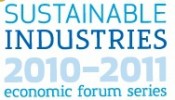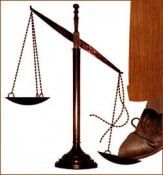Q&A: CAMERON SINCLAIR
Written on February 10th, 2011 |
Aired 02/06/11
CAMERON SINCLAIR was trained as an architect at the University of Westminster and at the Bartlett School of Architecture, University College London. His postgraduate thesis focused on providing shelter to New York's homeless through sustainable, transitional housing. After his studies, he moved to New York where he worked as a designer and project architect.
In 1999 Cameron Sinclair and Kate Stohr founded Architecture for Humanity, a grassroots nonprofit organization that seeks architectural solutions to humanitarian crises. Sinclair and Stohr compiled a bestselling book Design Like You Give A Damn: Architectural Responses to Humanitarian Crises.
Sinclair is a TED prize recipient, a Young Global Leader of the World Economic Forum, and serves on advisory boards of the Acumen Fund, the Institute for State Effectiveness and the Ontario College of Art and Design. As a result of the 2006 TED Prize, Architecture for Humanity launched the Open Architecture Network, the world's first open source community dedicated to improving living conditions through innovative and sustainable design. Every two years this network hosts a global challenge to tackle a systemic issue within the built environment.
Q&A: BOB EDGAR, Pres./CEO of Common Cause – SCOTT NELSON, Attorney
Written on January 29th, 2010 |
Aired 01/24/10
Has government of, by and for the people perished from the United States?
January 21st, a divided Supreme Court reversed precedent and law, voting 5-4 in Citizens United v. FEC to remove limits on corporate contributions to political campaigns. We'll discuss the decision in the context of money in politics, looking at potential outcomes and possible remedies.
BOB EDGAR is President and CEO of Common Cause, a grassroots advocacy organization working for democracy reform, with nearly 400,000 members and supporters and state chapters in 36 states. Edgar previously served as general secretary of the National Council of the Churches of Christ in the USA, the leading U.S. organization in the movement for Christian unity, and before that as president of the Claremont School of Theology. He was elected to the U.S. House in 1974, the first Democrat in 82 years to represent the heavily Republican 7th Congressional District near Philadelphia.
SCOTT NELSON is an attorney at the Public Citizen Litigation Group in Washington, D.C., where he has practiced since August 2001. After graduating with honors from Harvard College, Nelson attended Harvard Law School, and was elected President of the Harvard Law Review in 1983. He then served as a law clerk to Supreme Court Justice Byron White. Nelson represented key Congressional sponsors of McCain-Feingold before the Supreme Court in Citizens United v. Federal Election Commission.
http://www.commoncause.org/
http://www.publicintegrity.org/
http://www.citizen.org/
http://www.publicampaign.org/
http://www.thealliancefordemocracy.org/
http://www.movetoamend.org/
http://www.freespeechforpeople.org/
Q&A: KEVIN DANAHER, organizer and NORM STAMPER, author
Written on December 20th, 2009 |
Aired 12/06/09
This past week marked the tenth anniversary of the World Trade Organization's confrontation in Seattle with 50,000 protestors against corporate globalization. We look back at Seattle and at the ten years in between with two guests who played important roles.
First, we talk with NORM STAMPER -- who oversaw the police response -- about those events and about his life and work in the decade since. Now retired, Stamper wrote the book, BREAKING RANK and has become a prominent spokesman for LEAP, Law Enforcement Against (Drug) Prohibition.
NORM STAMPER, former Seattle Police Chief author BREAKING RANK: A TOP COP'S EXPOSE OF THE DARK SIDE OF AMERICAN POLICING
http://www.normstamper.com/
http://www.leap.cc/cms/index.php
Second, KEVIN DANAHER, who was centrally involved in organizing the Seattle WTO protests. His goals remain the same but his focus has evolved. His latest books are THE GREEN FESTIVAL READER: Fresh Ideas from Agents of Change, and BUILDING THE GREEN ECONOMY: Success Stories from the Grassroots
http://www.globalexchange.org/
http://www.globalcitizencenter.org/
http://www.greenfestivals.com/
Come Home Again, America
Written on November 21st, 2005At 24, I worked for George McGovern’s 1972 Presidential campaign. In 2005, I had the opportunity to interview him for an hour with the release of the documentary, One Bright Shining Moment: The Forgotten Summer of George McGovern. Robert Kennedy described him as the most decent man he’d ever met in politics. I agree. This interview was originally published at Alternet November 21, 2005.
In addition to his pledge to begin withdrawing US troops from Vietnam on Inauguration Day, George McGovern was for universal health care, a guaranteed minimum income, and tax reform. Not only that, his grassroots campaign wasn’t controlled by party bosses or professionals.
I couldn’t resist. I left paradise and drove back to the States in time to work the last two primaries in California and New York and the convention in Miami. As a reward for my efforts I was given the job of running California’s most conservative Democratic assembly district in southeast Los Angeles County, consisting of a few Latinos, a lot of Humphrey-loving unionists and, to the right of them, Wallace folks.
I was asked to win 37 percent of the vote. Without a university, a community college or a single affluent neighborhood in the region, and using a canvassing army of mostly high school students, that’s exactly what we did. Unfortunately, that’s all the campaign got nationally, losing to Richard Nixon 49 states to one. In our campaign office in Downey, we wept.
A decorated World War II bomber pilot, George McGovern ran the Food for Peace Program under John Kennedy and represented South Dakota for two terms in the House and three terms in the Senate. He’s written nine books, including his most recent, Ending Hunger Now: A Challenge to Persons of Faith. The late Robert Kennedy described McGovern as the most decent man he’d ever met in politics. A documentary about the campaign, One Bright Shining Moment: The Forgotten Summer of George McGovern, is now playing in select theaters. (photo: iowademocrats.org)

